Government Ministers Stall on GM Crop Ban
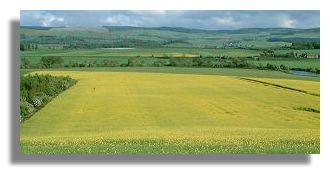
An evaluation was published this week of the impact of genetically modified oil seed rape grown in Scotland, in the largest trial carried out so far in the country . It appeared to suggest that they caused more damage to wild life and the environment than conventional varieties. But another trial, in England, on genetically modified maize, found that overall it was more beneficial than conventional crops for farmland wildlife. Campaigners against GM crops (who had tried earlier to disrupt the trials by ploughing them up) immediately demanded that all trials should be stopped. But the Scottish Executive has said that it would be premature to take a decision on commercial growing of GM crops before the results of all the tests had been fully assessed. GM crops which are resistant to weedkillers are now grown in the US and Australia. But in Europe and the UK, farmland is not just a business for producing crops, it is also used for leisure. So the public, as well as conservationists, want to see wildlife thriving there too. Of course, modern farming methods over the last 50 years have had a major detrimental impact on bio-diversity in the countryside. But it is argued that GM crops resistant to weeds would allow farmers to wipe out more of the plants on which insects and birds depend. The trials did not address the issue of any possible harm to humans from GM food products.
Scotland Lags UK
First, the good news. According to the Royal Bank of Scotland's "Purchasing Managers Report", Scottish firms have bounced back in the latest quarter with positive figures for output which have not been so good since Quarter 2 in 2002. New orders are also well up, with an 18-month high. But the bad news is that the Scottish figures trail every other region in the UK. The UK percentage of companies reporting an increase in new orders reached 57.6% but the Scottish figure was only 52.9%. The East Midlands of England reached nearly 60%.
New Concert Arena
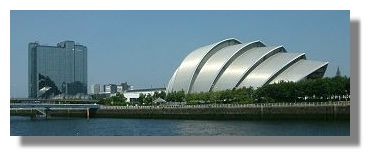
The Scottish Exhibition and Concert Centre in Glasgow has unveiled plans to create a second 12,500 seat concert arena costing £60 million and a new civic square capable of hosting outdoor events with a capacity of 25,000. There would also be a spectacular River Gardens beside the adjacent Moat House Hotel. The aim of the new arena is to attract top pop and entertainment stars to Glasgow.
The illustration shows the existing Clyde Auditorium (nicknamed locally as the "Armadillo") and the Moat House Hotel on the north bank of the river Clyde.
Lack of Blood Puts Operations at Risk
The Scottish National Blood Transfusion Service issued a warning this week that vital operations across Scotland might have to be cancelled because of the lack of blood donors. Over the last three months, they have been 28% down on the normal level, with 7,500 fewer donations than their target. In the Highlands, the fall has been even more severe - donations have been 50% down on target levels since April. An urgent appeal for donors has been launched and TV, radio and newspapers have been headlining the shortfall. Donations are usually down over the summer as volunteers head off to the sun but it has been particularly bad this year. Only 6% of the eligible population (those in good health between the ages of 17 and 60) make blood donations.
Dispute Over Repair Costs for Clyde Tunnel
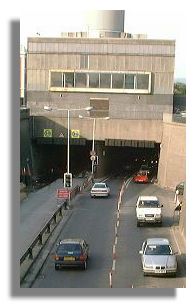 Motorists who drive through the tunnel under the river Clyde in Glasgow sometimes look up apprehensively as drops of water from the river above drip onto their windscreens. The 40-year-old tunnel carries 65,000 vehicles a day and when it was built, central government paid 75% of the cost because it was seen as a national as well as a local asset. 75% of all journeys through the tunnel either begin or end outside of Glasgow's boundaries. But since then, maintenance costs have had to come out of the city's general roads budget. However, new European safety rules mean that over £10 million worth of work is required immediately and another £12 million will be required by 2009. Glasgow City Council have asked the Scottish Executive for assistance with the cost - so far without success. If no funds are forthcoming, it will mean that the cash will not be available for maintenance of other roads in the city. Meantime, those drips keep falling...
Motorists who drive through the tunnel under the river Clyde in Glasgow sometimes look up apprehensively as drops of water from the river above drip onto their windscreens. The 40-year-old tunnel carries 65,000 vehicles a day and when it was built, central government paid 75% of the cost because it was seen as a national as well as a local asset. 75% of all journeys through the tunnel either begin or end outside of Glasgow's boundaries. But since then, maintenance costs have had to come out of the city's general roads budget. However, new European safety rules mean that over £10 million worth of work is required immediately and another £12 million will be required by 2009. Glasgow City Council have asked the Scottish Executive for assistance with the cost - so far without success. If no funds are forthcoming, it will mean that the cash will not be available for maintenance of other roads in the city. Meantime, those drips keep falling...
Executive U-turn on Relocation
Despite its stated aim to relocate large numbers of government jobs from Edinburgh to other parts of the country, the Scottish Executive have now modified the controversial relocation of Scottish Natural Heritage to Inverness. There was delight in the capital of the Highlands when the move was announced - but anger and depression amongst the SNH staff in Edinburgh. Now, after reports of the escalating costs of relocation and redundancy payments (now estimated by consultants at over £40 million) and as the SNH staff fought a valiant rear-guard action against the relocation policy, the Scottish Executive has announced that 50 of the 240-strong workforce will be staying in Edinburgh "if it makes sound operational or business sense." The staff involved are those working on projects in the southern half of Scotland. Despite the concession, staff are said to be considering "selected strike action" - refusing to advise the government on legislation. They say this would highlight the importance of the work done by the SNH staff.
After Monet - Titian
 The National Gallery of Scotland may not be able to repeat the success of the current Monet exhibition - which is expected to have attracted 150,000 people by the time it closes on 24 October. But they are going to have a good try. Timothy Clifford, the director general of the National Galleries is putting the finishing touches to a new exhibition - "The Age of Titian". But Old Master paintings from 500 years ago apparently do not have the same attraction as the 19th and 20th century impressionists. But next year's show will include 80 paintings and 50 drawings, with nine or ten paintings by Titian and the rest by artists such as Tintoretto, Lotto and Bellini. The centrepiece will be Titian's masterpiece "Venus Anadyomene" which was purchased by the National Gallery from the Duke of Sutherland's collection earlier this year. Two other Titian paintings belonging to the Duke of Sutherland have been on display at the gallery, free of charge, for the last 50 years.
The National Gallery of Scotland may not be able to repeat the success of the current Monet exhibition - which is expected to have attracted 150,000 people by the time it closes on 24 October. But they are going to have a good try. Timothy Clifford, the director general of the National Galleries is putting the finishing touches to a new exhibition - "The Age of Titian". But Old Master paintings from 500 years ago apparently do not have the same attraction as the 19th and 20th century impressionists. But next year's show will include 80 paintings and 50 drawings, with nine or ten paintings by Titian and the rest by artists such as Tintoretto, Lotto and Bellini. The centrepiece will be Titian's masterpiece "Venus Anadyomene" which was purchased by the National Gallery from the Duke of Sutherland's collection earlier this year. Two other Titian paintings belonging to the Duke of Sutherland have been on display at the gallery, free of charge, for the last 50 years.
Container Port for Ayrshire?
The owners of the Hunterston Container Port in Ayrshire have announced that they are planning to create a multi-million pound container freight hub which could generate up to 1,000 new jobs. Hunterston's deep water harbour already handles imported coal but a "megaport" is needed to handle the larger container ships which have trebled in size over the last ten years. The main European ports for this type of ship are Antwerp in Belgium and Rotterdam in Holland, but these ports are now overstretched.
40% More Seats on Flagship Rail Service
 Regular commuters on the busy Scotrail service between Scotland's two largest cities should have less crowded trains in future. The company is introducing eight new Turbostar trains with a 40% increase in seating capacity on the flagship Edinburgh to Glasgow route. The service runs every 15 minutes and the longer trains will operate on departures between 7am and 8.30am and again between 4.30pm and 6pm. Another 21 Turbostars are being added to the fleet already operating in Scotland. Platforms at places such as East Kilbride are having to be lengthened to cater for the new, higher capacity rolling stock.
Regular commuters on the busy Scotrail service between Scotland's two largest cities should have less crowded trains in future. The company is introducing eight new Turbostar trains with a 40% increase in seating capacity on the flagship Edinburgh to Glasgow route. The service runs every 15 minutes and the longer trains will operate on departures between 7am and 8.30am and again between 4.30pm and 6pm. Another 21 Turbostars are being added to the fleet already operating in Scotland. Platforms at places such as East Kilbride are having to be lengthened to cater for the new, higher capacity rolling stock.
Male Domination Ends
 After 443 years, the "stained glass ceiling" in the Church of Scotland is about to crack when it elects its first female Moderator of the General Assembly, its most senior post (which is held for a year). In the largely decentralised church, the Moderator chairs the annual meeting or General Assembly, which has the authority to make laws on how the Church of Scotland operates. Last year it was thought that a woman might be elected, but eventually it was the male candidate who won. This year, two women have ben nominated, ensuring that there can be no male bias at the final stage. The Church of Scotland has its origins in the Calvinist doctrines of John Knox - who published his "First Blast of the Trumpet Against the Monstrous Regiment of Women" in 1558. In it, he wrote "to promote a woman to bear rule, superiority, dominion or empire above any realm is repugnant to nature, contrary to God." Admittedly, he was railing against the Catholic Mary of Guise, the influential mother of Mary Queen of Scots.
After 443 years, the "stained glass ceiling" in the Church of Scotland is about to crack when it elects its first female Moderator of the General Assembly, its most senior post (which is held for a year). In the largely decentralised church, the Moderator chairs the annual meeting or General Assembly, which has the authority to make laws on how the Church of Scotland operates. Last year it was thought that a woman might be elected, but eventually it was the male candidate who won. This year, two women have ben nominated, ensuring that there can be no male bias at the final stage. The Church of Scotland has its origins in the Calvinist doctrines of John Knox - who published his "First Blast of the Trumpet Against the Monstrous Regiment of Women" in 1558. In it, he wrote "to promote a woman to bear rule, superiority, dominion or empire above any realm is repugnant to nature, contrary to God." Admittedly, he was railing against the Catholic Mary of Guise, the influential mother of Mary Queen of Scots.
Motorists Pay £60,000 a Day to City Council
Parking meter charges and fines are netting Glasgow City Council £60,000 a day, according to figures published this week. The city has raised £8.5 million in the first six months of the year, £250,000 more than expected. A spokesman for the Automobile Association said that motorists in the UK pay £38 billion a year in taxes and that high city-centre charges are driving people away to out of town shopping centres with free parking.
Rescue Plan for Spawning Salmon
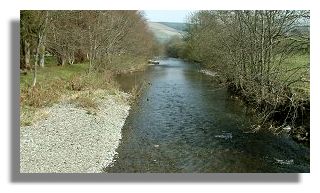 Despite some recent rain in many parts of the country, water levels on the river Tweed are so low that salmon returning to the river to spawn have been unable to get up-river to lay their eggs. So over 200 million gallons of water will be released from reservoirs over the next three days to help migrating salmon get up the river. It is estimated that 3,500 salmon are unable to get to the upper reaches of the river Ettrick, a tributary of the Tweed. At times, half of the water is diverted to a fish farm at the side of the river and the River Tweed Commissioners have complained to the owners about them not maintaining the proper water levels.
Despite some recent rain in many parts of the country, water levels on the river Tweed are so low that salmon returning to the river to spawn have been unable to get up-river to lay their eggs. So over 200 million gallons of water will be released from reservoirs over the next three days to help migrating salmon get up the river. It is estimated that 3,500 salmon are unable to get to the upper reaches of the river Ettrick, a tributary of the Tweed. At times, half of the water is diverted to a fish farm at the side of the river and the River Tweed Commissioners have complained to the owners about them not maintaining the proper water levels.
Speaking Clock Gets Scottish Accent
 For the last week, callers who check the time at British Telecom's "Speaking Clock" have been greeted by a young Scottish voice, instead of the usual precise but bland accent. Alicia Roland from Renfrewshire, aged 12, won a competition to be the voice for a week. The judges thought she sounded warm and friendly. She greets callers with "It's time to listen to young people" before giving a precise time check. It is the first time that the speaking clock has had a Scottish accent.
For the last week, callers who check the time at British Telecom's "Speaking Clock" have been greeted by a young Scottish voice, instead of the usual precise but bland accent. Alicia Roland from Renfrewshire, aged 12, won a competition to be the voice for a week. The judges thought she sounded warm and friendly. She greets callers with "It's time to listen to young people" before giving a precise time check. It is the first time that the speaking clock has had a Scottish accent.
No Discrimination Against English Immigrants
Research by Dundee University has shown that 90% of English migrants to Scotland have not experienced any discrimination other than "teasing or banter" - usually when Scotland play England at football or rugby. The study shows that they are the target of much less violence, harassment or discrimination than other ethnic minority groups in Scotland. There had been reports of English people living in Scotland saying that their Scottish neighbours were Anglophobic. At the last count (in 2001) there were 408,000 born in England now living in Scotland. By contrast, the number of Irish-born migrants in Scotland is 21,774 (down from a peak of 218,745 recorded in the 1881 census). Perhaps some day a university will conduct a similar study to find out if Scots who move to England are subjected to discrimination.
Mice Found in Bookshops!
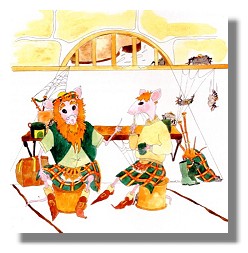 Hamish McMoosie, the bagpiping member of the only clan of mice in the world with its own tartan officially registered with the Tartans Authority, has a rare talent for mischief and his exploits are being recorded in a series of books by Terry Isaac - who really does live over the wall from the Brechin Tower where many of the exploits take place. Terry has written a number of books on Hamish which have found their way into many bookshops - and even the Library of Congress in the US. Waverley Books have published four titles this Autumn, including "Hamish McMoosie and the Marvellous Set of New Bagpipes". And Hamish also features in two radio scripts, which have been recorded by the popular singer and entertainer Isla St Clair. These are available for Radio networks. Terry also devotes a great deal of time to talking to and listening to children in schools and in the last year alone has visited more schools than you could shake a spirtle at! For more details and how to get these great children's books in time for Christmas, see the extract here.
Hamish McMoosie, the bagpiping member of the only clan of mice in the world with its own tartan officially registered with the Tartans Authority, has a rare talent for mischief and his exploits are being recorded in a series of books by Terry Isaac - who really does live over the wall from the Brechin Tower where many of the exploits take place. Terry has written a number of books on Hamish which have found their way into many bookshops - and even the Library of Congress in the US. Waverley Books have published four titles this Autumn, including "Hamish McMoosie and the Marvellous Set of New Bagpipes". And Hamish also features in two radio scripts, which have been recorded by the popular singer and entertainer Isla St Clair. These are available for Radio networks. Terry also devotes a great deal of time to talking to and listening to children in schools and in the last year alone has visited more schools than you could shake a spirtle at! For more details and how to get these great children's books in time for Christmas, see the extract here.
Scotland's Best - Bar None
The 2004 edition of the "Good Pub Guide" has named the Steampacket on the Isle of Whithorn in Galloway as the pub serving the best food in Scotland. Despite the accolade of serving such excellent food, it does not charge gastronomic prices, with most main meals priced about £10. Of course, with its location in sight of the harbour, there is an emphasis on fresh seafood although there is also venison on the menu - supplied by a local butcher. The location, far from large centres of population, means that the Steampacket must provide the sort of meals which will encourage people to travel some distance and coming back. The Good Pub Guide has found that many other outlets have been increasing prices at a rate which is well above inflation - one in seven pubs has increased their prices by as much as 25% in the last year.
Lucky 13
 Two players at East Renfrewshire Golf Club defied the odds this week by sinking both their drives at the same hole - now renamed "Lucky 13". They are both 14 handicap golfers playing in a corporate event. There was delight when the first ball went straight in the hole but utter astonishment when the second player did the same thing.
Two players at East Renfrewshire Golf Club defied the odds this week by sinking both their drives at the same hole - now renamed "Lucky 13". They are both 14 handicap golfers playing in a corporate event. There was delight when the first ball went straight in the hole but utter astonishment when the second player did the same thing.
A Prickly Problem
With the closure of Glasgow Zoo, efforts are being made to find new homes for all the animals which were on show there. Which is why two rare Cape Porcupines were sent to the popular Heads of Ayr holiday park. But the handlers at the park found that the prickly spines were too sharp for them to handle - and have insisted on sending them back to Glasgow Zoo. The creatures can grow to the size of a small dog, can move quickly - and have sharp teeth too.
That Was The Month That Was
The Scottish Meteorological Office has published the aggregate weather statistics for September and they show that while rainfall was well below average, hours of sunshine were only above the usual level in the north-east of Scotland. Temperatures, however, were above the usual level for September, mainly by about 1C, though the south-east was 1.5C above the long-term average for the month.The highest temperature of 25.1C (77.2F) was recorded at Lossiemouth on the Moray Firth on 17 September. Aboyne in Aberdeenshire recorded the lowest overnight temperature with -2.4C (27.7F) on 24 September.
Weather in Scotland This Week
Maximum daytime temperatures have hovered around 13/15C (55/59F) for most of the week although a stiff, easterly breeze has often made it feel chillier than that. From Monday to Wednesday the sun was conspicuous by its absence but on Thursday and Friday there was wall-to-wall sunshine over much of the country, especially in the west. Glasgow recorded 9.3 hours of sunshine on Thursday and on the same day none of the Scottish weather stations recorded any rain falling for 24 hours - and Friday was very dry too.
This week's illustrations of current flowers and fauna in Scotland (see below) were taken on Friday at the National Trust for Scotland's Crarae Garden, south of Inveraray in Argyll. The birds (did you spot all three of them) are Fieldfares (Turdus pilaris), one of the Thrush family. They are migrants that arrive around October in flocks and eat up as many berries as they can find before winter arrives. They were thoroughly enjoying the rowan (mountain ash) berries at Crarae. The delicate pink flowers are of the Persicaria Campanulata, one of the Knotweed family. The fragrant flowers have a long season, first appearing in summer and continuing into the autumn.
 
|


The Scottish Snippets Newsletter in its original format began in April 1997 and continued in an unbroken series for 591 issues. Although no longer produced in that format there is now a regular update on the new and updated pages on the Rampant Scotland site and also "Scottie's Diary" on an intermittent basis, To receive this, kust send an e-mail to Scottie with "Subscribe Newsletter" in the subject line.
 Historical Affairs - Topical Items from Scotland's Past
Historical Affairs - Topical Items from Scotland's Past


